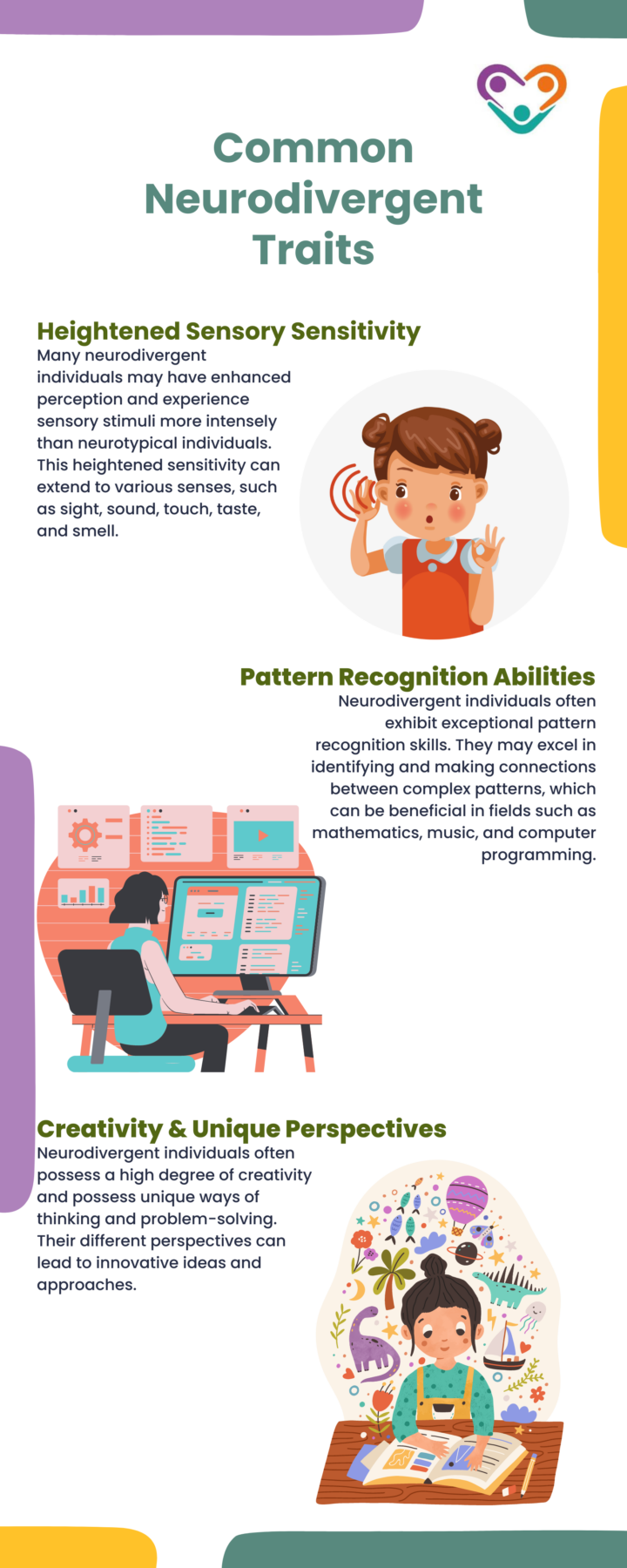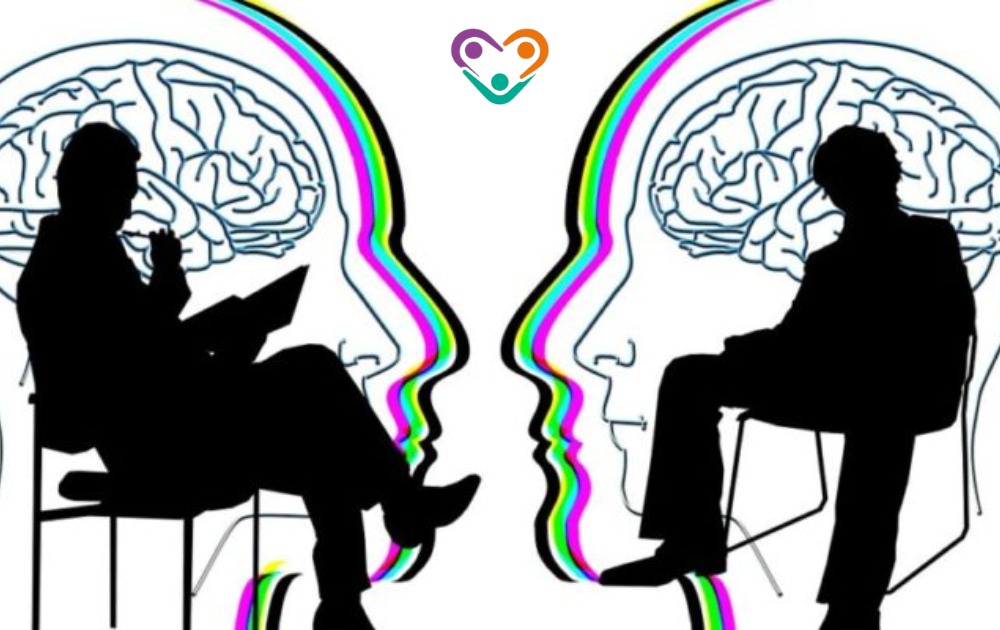Imagine a world where every brain works differently, each one unique and special in its own way. This is the world of neurodiversity, where the term “neurodivergent” is used to describe individuals whose brains function differently from the typical or “neurotypical” patterns.
Understanding neurodivergent traits helps us appreciate the diverse ways people think, learn, and interact with the world. In this article, we’re going to explore these traits so we can celebrate the strengths and abilities that make each person uniquely themselves!
Overview of Neurodivergent Traits
Neurodivergent individuals may possess unique strengths and challenges that are associated with their cognitive differences. These traits can vary widely among individuals, as each person experiences a combination of neurodivergent traits that may be associated with different conditions.
Some of the most common neurodivergent traits include:

Neurodiversity and Genetics
Neurodiversity is a concept that recognizes and celebrates the natural variations in the human brain and neurodevelopment. It acknowledges that neurodivergent traits are not abnormalities or deficits but rather valuable aspects of human diversity.
While the exact causes of neurodivergence are still being studied, research suggests that both genetic and environmental factors play a role. Many neurodivergent conditions, including ADHD and autism spectrum disorder, have strong genetic links. However, environmental factors can also influence the expression of these traits.
It is important to approach neurodiversity with understanding and acceptance, recognizing that neurodivergent individuals have unique strengths and perspectives that can contribute positively to society.
Strengths of Neurodivergent Individuals
Neurodivergent individuals possess a range of unique strengths that contribute to their valuable perspectives and abilities. Understanding and appreciating these strengths can help foster a more inclusive and supportive environment for individuals with neurodivergent traits.
Let’s look at each of them.

Enhanced Perception and Sensory Sensitivity
One of the remarkable characteristics of neurodivergent individuals is their enhanced perception and sensory sensitivity. They have the ability to immerse themselves more fully in the sensory symphony of life, allowing them to perceive and experience the world in a unique way.
While this heightened sensitivity can occasionally present challenges in stressful situations, it also provides a lens through which they can deeply appreciate and interact with the world around them.
Pattern Recognition Abilities
Neurodivergent individuals often possess exceptional pattern recognition abilities. They have a natural talent for unraveling complicated patterns, identifying connections, and spotting trends in large data sets. This skill set allows them to approach problem-solving from a different angle.
Their ability to perceive patterns and make connections that others may overlook can be a valuable asset in various fields, including science, technology, mathematics, and art.

Creativity and Unique Perspectives
Neurodivergent traits, such as creativity, imagination, emotional intelligence, persistence, and inquisitiveness, are considered strengths.
Individuals with these traits often possess a unique perspective that goes beyond conventional thinking. They have the ability to question established wisdom, reshape the world through their own lens, and contribute to creative, intellectual, and commercial pursuits. Their non-linear thinking sparks innovation and can lead to breakthroughs in various industries.
Recognizing and celebrating these strengths can empower neurodivergent individuals to thrive and contribute their unique talents to society. It is essential to foster an inclusive environment that values and supports the diverse strengths and perspectives of all individuals, regardless of their neurodivergent traits.
Neurodivergent Traits in the Workplace
Neurodiversity is a concept that recognizes and values the unique strengths and perspectives of individuals with neurodivergent traits. In the workplace, neurodivergent individuals bring a diverse set of skills and abilities that can contribute to a thriving and innovative environment.
Based on statistics from the British Dyslexia Association (BDA), it is estimated that at least 15% of the working population have some neurodivergent traits. These traits are associated with conditions such as dyslexia, ADHD, Autism Spectrum Condition (ASC), PTSD, migraines, and more.
It’s important to note that these traits can appear in different combinations in each individual, and it’s more common to have co-occurring traits from several different neurodivergent conditions rather than traits associated with just one condition.
These statistics highlight the prevalence of neurodiversity in the workplace and emphasize the significance of creating an inclusive and supportive environment that values and accommodates the unique strengths and challenges of neurodivergent individuals.
Moreover, neurodivergent individuals possess a range of strengths that can positively impact their work performance. Some of these strengths include enhanced perception and sensory sensitivity, pattern recognition abilities, heightened creativity, and unique perspectives.
These traits can contribute to problem-solving, innovation, and out-of-the-box thinking in the workplace.
However, neurodivergent individuals may also face challenges that can impact their work performance. Short-term memory issues, for example, can make it difficult to retain and recall information in fast-paced environments. This can be particularly challenging when a lot of information is shared orally, as individuals with poor short-term memory may struggle to retain a significant amount of information at once.
Organizational skills and time management are additional areas where common neurodivergent traits can affect individuals’ effectiveness in the workplace. Challenges in these areas can be addressed through coaching, technology solutions, and organizational support tailored to the individual’s needs.
The Bottom Line
In understanding neurodivergent traits, we open the door to a richer, more inclusive world. Embracing these differences not only helps us appreciate the diverse ways people experience life but also fosters a more supportive and accepting society.
Learning about neurodiversity allows us to better connect with and value each individual’s unique perspective, paving the way for greater empathy and collaboration.
Together, we can build a world where everyone’s traits are celebrated and understood, making our communities stronger and more vibrant. If you’re looking for support through ABA programs in NJ, Indiana, Georgia, and New York, Golden Care Therapy is here to help. Learn more about our services or schedule a consultation right away.
Visit our website or call us now to get started on your journey with compassionate, personalized care.



